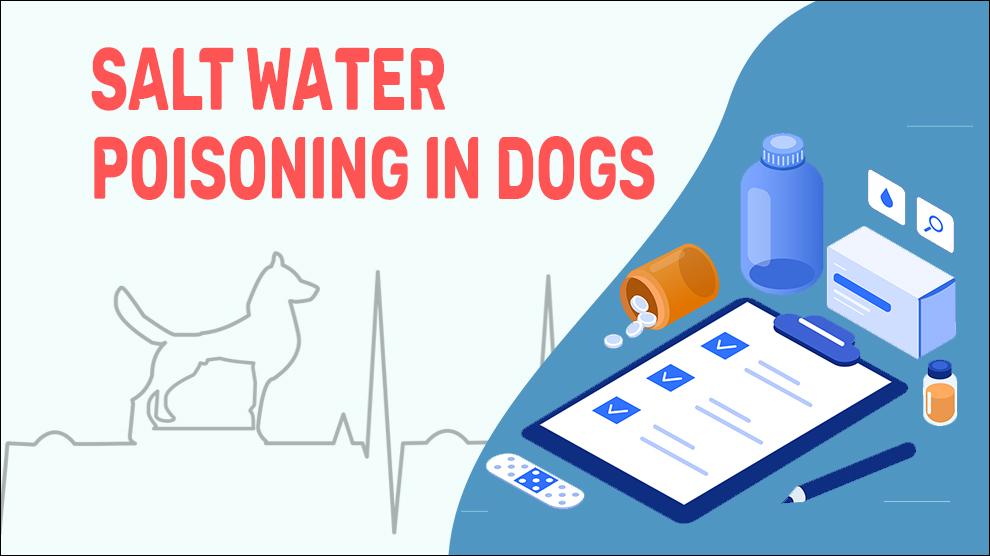What Is Salt Water Poisoning In Dogs?
Salt water poisoning can be a serious and potentially life-threatening condition in dogs. If you suspect your dog has consumed too much salt water, seek veterinary care immediately.
Provide fresh water to rehydrate them and avoid salty foods or treats. Preventing salt water poisoning is key, so always provide access to fresh water and discourage your dog from drinking salt water.
Symptoms Of Salt Water Poisoning In Dogs
Treatment Options For Salt Water Poisoning In Dogs
If you suspect that your dog has ingested too much salt water, it is important to seek veterinary care immediately.
Your veterinarian may perform blood tests to check your dog's electrolyte levels and may administer intravenous fluids to rehydrate your dog and correct any imbalances.
In severe cases, your dog may need hospitalization and supportive care, such as oxygen therapy or anticonvulsant medication to control seizures. The prognosis for saltwater poisoning is good with prompt veterinary care.
Home Remedies For Salt Water Poisoning In Dogs
While it is important to seek veterinary care for saltwater poisoning, there are some steps you can take at home to help your dog recover.
Offer fresh water: Offer your dog fresh water to drink to help rehydrate them. You can also add some low-sodium chicken broth to their water to make it more appealing.
Monitor their electrolyte levels: If your dog is undergoing treatment for saltwater poisoning, your veterinarian may recommend monitoring their electrolyte levels at home.
This can be done with at-home test kits or by collecting urine samples to check the levels of sodium and other electrolytes.
How To Prevent Salt Water Poisoning In Dogs?
Preventing saltwater poisoning is key, and there are several steps you can take to keep your dog safe:
Limit water intake: Keep your dog from drinking salt water by providing them with plenty of fresh water to drink. Make sure to bring a supply of fresh water with you when you go to the beach or to the pool.
Supervise your dog: Supervise your dog when they are in or near the water to prevent them from drinking salt water.
Rinse them off: After a swim, rinse your dog off with fresh water to remove any salt from their fur.
It is also a good idea to bring along a collapsible water bowl and refill it regularly.
If you notice your dog is excessively thirsty or has consumed salt water, take frequent breaks for them to drink fresh water and rest.
Affected Dog Breeds Of Salt Water Poisoning
While any dog can be affected by saltwater poisoning, certain breeds may be more prone to the condition.
These include retrievers, water dogs, and other breeds who love to swim and play in the water.
Causes For Salt Water Poisoning In Dogs
Causes:
Saltwater poisoning occurs when a dog ingests large amounts of salt water. This can happen when a dog drinks salt water at the beach or from a pool, or even from ingesting salt tablets or products containing high levels of salt.
Certain breeds may be more prone to saltwater poisonings, such as retrievers or water dogs who love to swim and play in the water.
When To See A Vet For Salt Water Poisoning In Dogs?
If you suspect your dog has ingested too much salt water, it is important to seek veterinary care immediately.
Some symptoms of saltwater poisoning include:
- Vomiting
- Diarrhea
- Lethargy
- Confusion
- Seizures
If left untreated, it can lead to brain damage and even death.
Food Suggestions For Salt Water Poisoning In Dogs
When it comes to food suggestions, it is important to provide your dog with fresh water to help rehydrate them.
Small amounts of low-sodium chicken broth can also be added to their water to encourage them to drink more.
It is important to avoid giving your dog any salty foods or treats, as this can worsen the electrolyte imbalance. Instead, offer bland, easily digestible foods such as boiled chicken and rice.
Conclusion
Saltwater poisoning is a serious condition that can have serious consequences for your dog. If you suspect that your dog has ingested too much salt water, it is important to seek veterinary care immediately.
Preventing saltwater poisoning is key, and there are steps you can take to keep your dog safe, such as limiting water intake and supervising them when they are in or near the water.
With prompt treatment and prevention, you can help keep your dog healthy and happy.

















